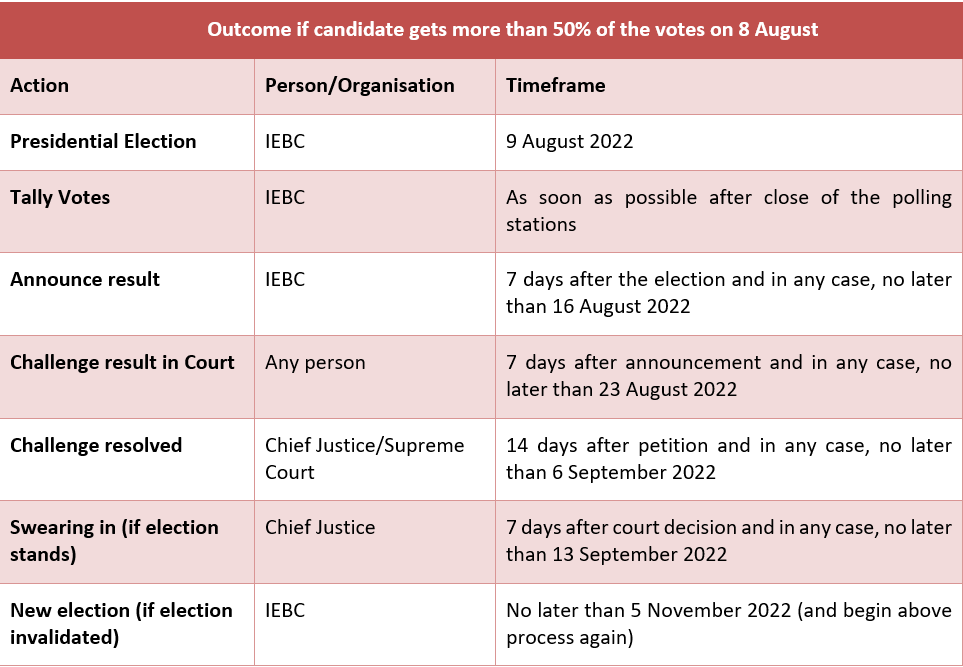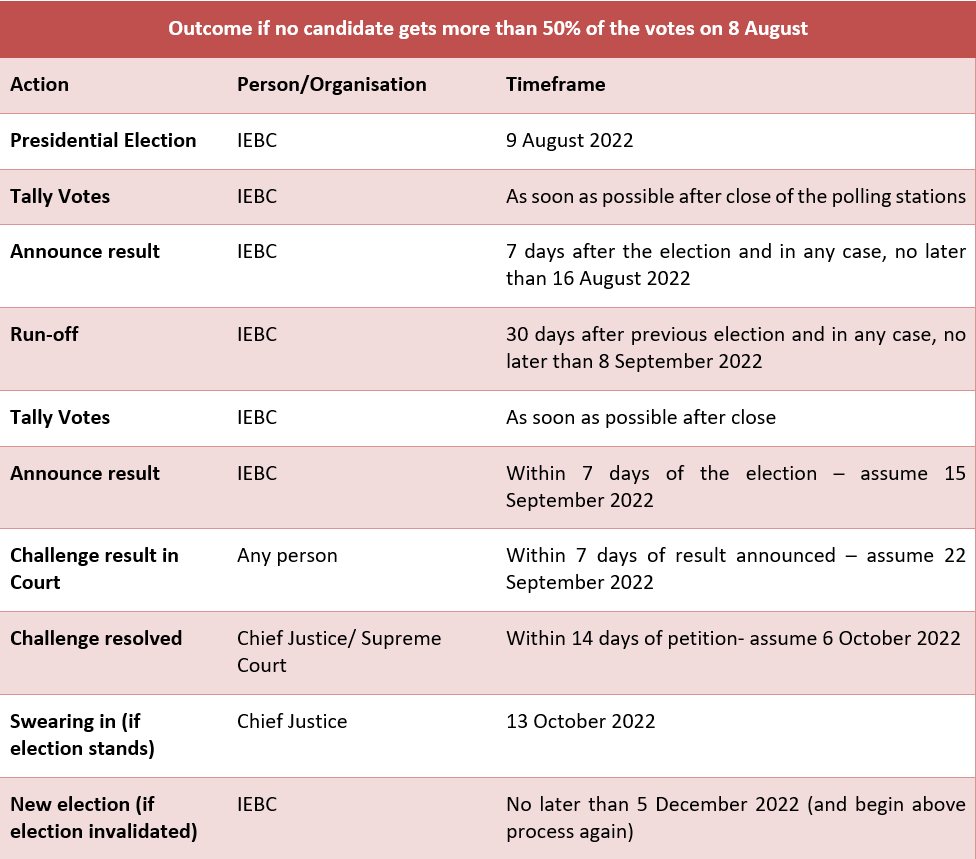On Tuesday, 9 August 2022, Kenya’s general elections will be held where all the elected seats are contestable. With Kenya’s trend-setting judicial intervention in the 2017 election causing confusion about the process, steps and timings that can be expected, this article discusses the presidential election process, as well as timelines and steps under different scenarios.
The Laws Applicable
In Kenya the laws that govern the election process are the Constitution of Kenya, 2010 (the Constitution), the Elections Act, Act 24 of 2011 (Elections Act) and the Assumption of the Office of President Act, Act 21 of 2012 (the Act).
Declaration of a Presidential Election Candidate as President
A candidate shall be elected as President if they receive:
(a) more than half of all the votes cast in the election (commonly referred to as the 50%+1 rule (fifty per cent of votes will be determined on the valid votes cast and will not include spoilt votes); and
(b) at least twenty-five per cent of the votes cast more than half of the counties (i.e. twenty four (24) counties).
When a Run-Off Takes Place
If no presidential candidate meets the statutory threshold, then a fresh election will take place within thirty (30) days of the previous election (the run-off). In the context of this election cycle, the run-off must occur prior to 8 September.
Tally of the Votes Cast in the Presidential Election
Under the Elections Act, the Independent Electoral and Boundaries Commission (IEBC) is required to electronically transmit and physically deliver the tabulated results of the presidential election from each polling station to the constituency and national tallying centres immediately polls close. They must also tally and verify the results and publish the polling result forms on an online portal which they are required by law to maintain.
The chairperson of IEBC is statutorily bound to declare the result of the election and deliver a written notification of the result to the Chief Justice and the incumbent President, within seven (7) days after the presidential election (this is no later than 16 August or 15 September for a run-off).
Where the IEBC is yet to receive results from all the constituencies but is of the opinion that the pending results would not make a difference with regard to the winner of the election, the law permits the chairperson to declare a winner.
Questions as to the Validity of the Presidential Election
Any person may file a petition in the Supreme Court to challenge the election of the President-elect within seven (7) days after the date of the declaration of the results of the presidential election.
The Supreme Court is required to hear and make a final determination of the petition within fourteen (14) days and no further right of appeal is available to any party. Assuming the IEBC declares a winner on 16 August and the runner up in this year’s election files a petition on the last possible day, that is, 23 August, the Supreme Court would render its decision by 6 September.
If the Supreme Court annuls the election of the President-elect, a fresh election must be held within sixty (60) days after the determination. If the determination were to be made on 6 September, the IEBC would have up to 5 November to conduct the fresh elections.
Swearing In Process
The swearing in of the Present-elect must be in public before the Chief Justice or in the absence of the Chief Justice, the Deputy Chief Justice.
The President-elect is required to be sworn in on the first Tuesday following:
a) the fourteenth (14th) day after the date of the declaration of the result of the presidential election, if no presidential election petition has been filed under Article 140 of the Constitution (assuming the declaration is made on 16 August, this would fall on 30 August); or
b) the seventh (7th) day following the date on which the court renders a decision declaring the election valid, if any petition has been filed under Article 140 of the Constitution (assuming the Supreme Court delivers its judgment on 6 September, this would fall on 13 September).
The Swearing in Ceremony Can Only Take Place between 10:00 a.m. and 2:00 p.m.
The President-elect takes office upon swearing an oath or making an affirmation of office, signing the certificate of inauguration and receiving the instruments of power from the outgoing President.
ALN Kenya looks forward to a peaceful and fair election and hopes that the winner, whomever that may be, oversees an inclusive and transparent government.
Summary Of Timeline

If no petition challenging the presidential election is filed, the swearing in will be on 30 August 2022.

Should you have any questions on this article, please do not hesitate to contact Karim S. Anjarwalla. Karim is a Senior Partner at ALN Kenya, which is generally considered the leading corporate law firm in Kenya and is the largest full-service corporate law firm in East Africa.
______________
Contributor
- Abdulmalik Sugow, Trainee Lawyer
- Fenan Estifanos, Trainee Lawyer


